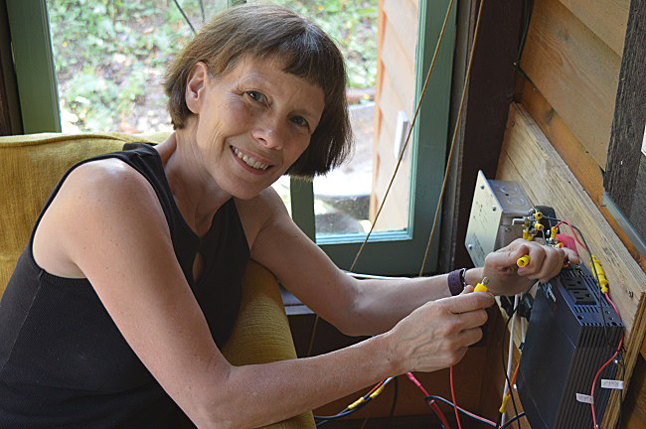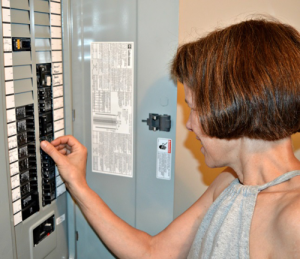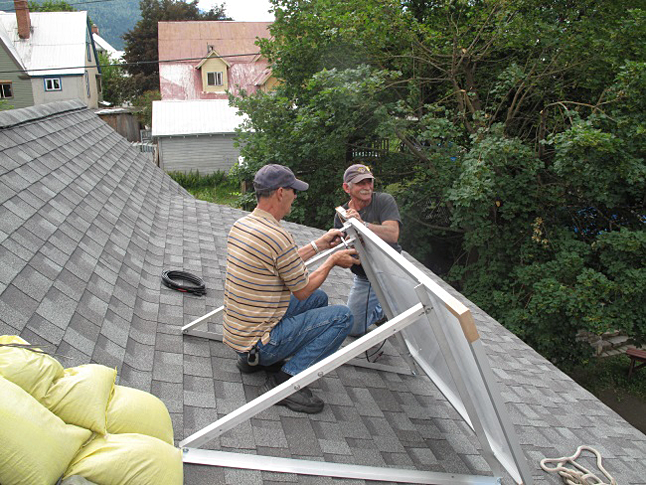
By Laura Stovel
Snap. Snap. Snap. At 9:30 pm on June 30th I switched off the hydro power in the fuse box of my home and ventured into a new world, one in which all the power that I use at home is generated by the sun. In downtown Revelstoke, for the months of July and August, I am going off the electrical grid and almost fossil fuel free.
Living comfortably off the grid and generating my own power has been a dream of mine for decades. Back in the early 1990s, when I was teaching school in Kang, Botswana, in the middle of the Kalahari Desert, I lived for a year in a mud hut in the village with no electricity or running water. I carried my water, bucket by bucket, on my head and cooked with a propane stove.
I loved that experience, but this project is very different. I will have modern conveniences – a small 12-volt fridge, my laptop, ipad, phone, a radio and two lights, all of which will run off one 250-watt solar panel and one 12-volt deep-cycle battery – and this time I will cook with the sun.
In my hut in Botswana I was so technically inept that I could not operate a kerosene lamp. I used candles for light for an entire year. This time round, fire is not allowed for cooking or for light. It’s too easy to fall back on such things, too much like camping.
Finally, I am going almost fossil fuel free. I have given myself a fossil fuel ‘budget’ of two car rides (return) a month. It’s summer and I’d like to be able to join friends on short camping trips and hikes out of town. There may also be a trip or two out of town for work-related reasons. Giving myself a car ride budget is a way of taking care of myself but also setting limits.
I have chosen this project for a few reasons. First, I am very concerned about climate change and hope to contribute in some small way to people’s efforts to conserve energy. Some of the steps I am taking are not easy to incorporate into people’s busy lives but some are very easy – like not turning on lights during the day time and walking or biking instead of taking a car.
Second, I wanted to gain some practical skills around alternative energy. I think that the houses of the future will generate their own power instead of working off a large grid or fossil fuel distribution system. Either here or in the developing world, I want to participate in that shift towards decentralization. I think that only once we generate our own power will we take responsibility for the power we use. Only then will we really start to conserve.
Finally, I wanted to write about this experience. For me, it’s a summer adventure and a learning experience but for many people in the world living without electricity is a fact of life. I wanted to use this experience to probe questions about my own lifestyle and habits, shared by many people around me, that lead me to consume so much energy.
I was lucky enough to have good friends and advisors to help me set up the system. Current owner David Rooney went to Kelowna with me to pick up my solar system. Sonny Pederson, John Bafaro, Dave Aubrey, Cornelius Suchy and Marc Paradis all had roles in helping me set the system up. I am proud to say that I can now wire a simple DC (direct current) system.
Ken Talbot at the Revelstoke Visual Arts Centre helped me build my first solar cooker and Lawrence Davies took the lead in building my manual washing machine.
They say it takes a village to raise a child. I’d say it takes a village to make a project like mine a success.
I invite you to follow my blog at http://myoffthegridsummer.blogspot.ca/. You can enter your e-mail address and receive notifications of new posts. I also invite you to add your ideas and comments as these will only enrich this project.
My next article for The Current will talk about solar cooking



